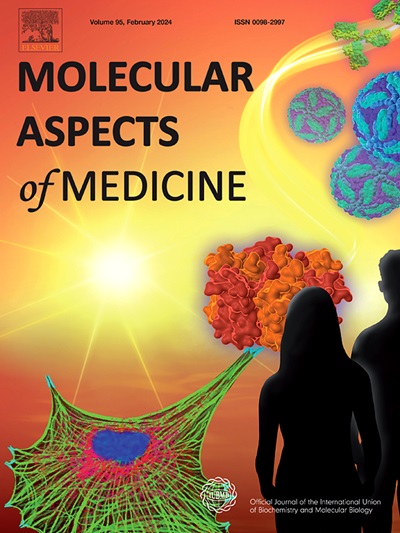呼吸道新发病毒和肺癌的耐药:治疗的挑战和新观点
IF 10.3
2区 医学
Q1 BIOCHEMISTRY & MOLECULAR BIOLOGY
引用次数: 0
摘要
新出现的病毒病原体,特别是针对呼吸系统的病毒,如SARS-CoV-2和流感病毒,给肺癌患者带来了重大挑战。由于免疫疗法、化疗和靶向药物等各种疗法的免疫抑制,这些患者对这些病毒引起的严重感染的易感性增加。呼吸道病毒感染可通过影响肿瘤微环境(TME)、调节免疫检查点或干扰治疗效果诱导肿瘤进展和耐药。本综述讨论了这些病毒病原体与肺癌之间的相互作用,强调了SARS-CoV-2和流感病毒影响肺癌TME促进肿瘤进展、免疫逃避并最终对酪氨酸激酶抑制剂(TKIs)和免疫检查点抑制剂(ICIs)等抗癌疗法产生耐药性的机制。本研究中讨论的部分包括:(1)对病毒感染的易感性增加,(2)病毒诱导的肿瘤微环境调节,以及(3)耐药机制。本综述还讨论了新兴策略,如溶瘤病毒治疗,作为肺癌治疗的潜在候选。本研究旨在通过回顾病毒学、肿瘤学和免疫学方面的证据,为SARS-CoV-2和流感病毒背景下肺癌患者的治疗优化提供新的视角。本文章由计算机程序翻译,如有差异,请以英文原文为准。
Respiratory emerging viruses and drug resistance in lung cancer: challenges and new perspectives in treatment
Emerging viral pathogens, particularly those targeting the respiratory system such as SARS-CoV-2 and influenza virus, pose significant challenges for patients with lung cancer. These patients show increased susceptibility to serious infections caused by these viruses as a result of immunosuppression from various therapies such as immunotherapy, chemotherapy, and targeted agents. Respiratory viral infections can induce tumor progression and drug resistance through affecting the tumor microenvironment (TME), modulating immune checkpoints, or interfering with therapeutic efficacy. The present review discusses the reciprocal interactions between these viral pathogens and lung cancer, underscoring mechanisms by which SARS-CoV-2 and influenza viruses affect the lung cancer TME promoting tumor progression, immune evasion, and ultimately, resistance to anti-cancer therapies such as tyrosine kinase inhibitors (TKIs) and immune checkpoint inhibitors (ICIs). Sections discussed in this study include: (i) increased susceptibility to viral infections, (ii) virus-induced modulation of the tumor microenvironment, and (iii) mechanisms of therapy resistance. This review also addresses emerging strategies, such as oncolytic virotherapy, as potential candidates for lung cancer treatment. It aims to provide new perspectives on therapeutic optimization for patients with lung cancer in the context of SARS-CoV-2 and influenza viruses, by reviewing evidence from virology, oncology, and immunology.
求助全文
通过发布文献求助,成功后即可免费获取论文全文。
去求助
来源期刊

Molecular Aspects of Medicine
医学-生化与分子生物学
CiteScore
18.20
自引率
0.00%
发文量
85
审稿时长
55 days
期刊介绍:
Molecular Aspects of Medicine is a review journal that serves as an official publication of the International Union of Biochemistry and Molecular Biology. It caters to physicians and biomedical scientists and aims to bridge the gap between these two fields. The journal encourages practicing clinical scientists to contribute by providing extended reviews on the molecular aspects of a specific medical field. These articles are written in a way that appeals to both doctors who may struggle with basic science and basic scientists who may have limited awareness of clinical practice issues. The journal covers a wide range of medical topics to showcase the molecular insights gained from basic science and highlight the challenging problems that medicine presents to the scientific community.
 求助内容:
求助内容: 应助结果提醒方式:
应助结果提醒方式:


